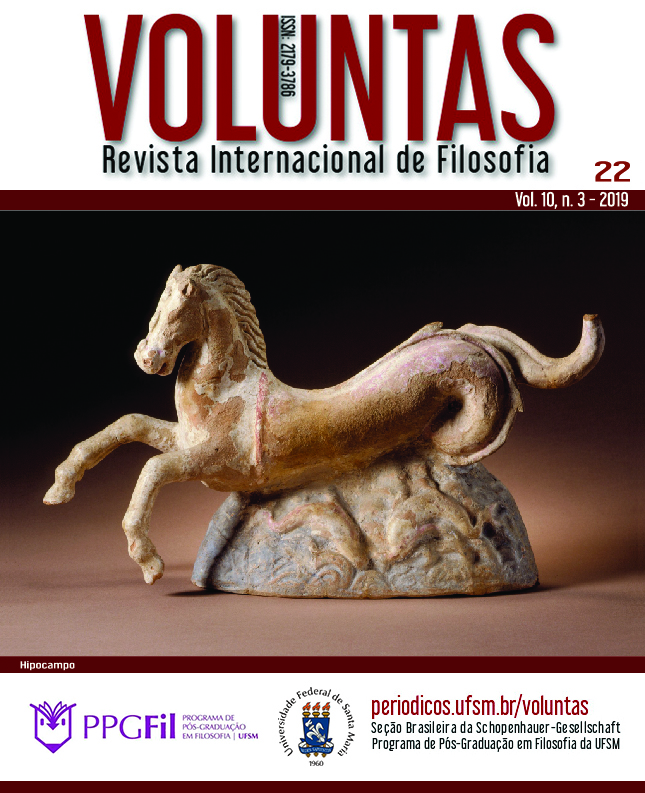O charlatanismo como problema estético-filosófico em Schopenhauer
DOI:
https://doi.org/10.5902/2179378639684Palavras-chave:
Estilo, Comunicação, Pedantismo, ObscuridadeResumo
O objetivo deste texto é o de apresentar as questões filosóficas que giram em torno da acusação schopenhaueriana corriqueira de charlatanismo contra seus adversários. O estudo dessas questões-satélites mostra que o charlatanismo pode ser compreendido como um problema filosófico e não mero xingamento vazio de relevância teórica, como se entende comumente. Elas podem ser resumidas como questões estéticas ou retóricas, porque problematizam o estilo do texto filosófico, o seu uso e sua função comunicativa. Próximo do pedante e do sofista, o charlatão é aquele que abusa da obscuridade por conta de seu afastamento da concretude por uma opção pela escrita abstrata.
Downloads
Referências
DIDEROT, Denis. Charlatannerie. In: DIDEROT, Denis & D’ALEMBERT, Jean le Rond. Encyclopédie ou dictionnaire raisonné des sciences, des arts et des métiers. Vol. 3. Paris: Briasson, David, Le Breton & Durand, 1751-1772.
GOETHE, Johann Wolfgang von. Faust. Trad. G. Nerval. Paris: Librio, 1995.
GRACIÁN, Baltasar. El Criticón. Tomo Tercero. Philadelphia: University of Pennsylvania Press, 1940.
HEIDEGGER, Martin. Nietzsche I. Trad. Marco Antonio Casanova. Rio de Janeiro: Forense universitária, 2010.
KIVISTÖ, Sari. The vices of learning: morality and knowledge at early modern universities, Leiden / Boston, Brill, 2014.
PHILONENKO, Alexis. Schopenhauer, une philosophie de la tragédie. Paris: Vrin, 1999.
RAMOS, Flamarion Caldeira. A “miragem” do absoluto: sobre a contraposição de Schopenhauer a Hegel. Crítica, especulação e filosofia da religião. Tese de doutorado. São Paulo: USP, 2008, 252 p.
ROOS, Richard. Introduction. In: SCHOPENHAUER, A. Le monde comme volonté et représentation. Paris: P.U.F., 2009, pp. xi-xxii.
ROSSET, Clément. Schopenhauer, philosophie de l’absurde. Paris: PUF, 1994.
SCHOPENHAUER, Arthur. O mundo como vontade e como representação. Trad. Jair Barboza. São Paulo: UNESP, 2005.
SCHOPENHAUER, Arthur. Crítica da filosofia kantiana. In: O mundo como Vontade e como representação. Trad. Jair Barboza. São Paulo: UNESP, 2005.
SCHOPENHAUER, Arthur. Suppléments. In: Le monde comme volonté et représentation. Trad. A. Burdeau. Paris: P.U.F., 2009.
SCHOPENHAUER, Arthur. Parerga et Paralipomena. Trad. J-P. Jackson. Paris: CODA, 2010.
SCHOPENHAUER, Arthur. Die Beiden Grundprobleme der Ethik. In: Sämtliche Werke, Mannheim: F. A. Brockhaus, 1988, t. 4.
UCCIANI, Louis. Comment Heidegger évince Schopenhauer. In: Philosophique, 9, 2006, pp. 89-102.
Publicado
Como Citar
Edição
Seção
Licença
A submissão de originais para este periódico implica na transferência, pelos autores, dos direitos de publicação impressa e digital. Os direitos autorais para os artigos publicados são do autor, com direitos do periódico sobre a primeira publicação. Os autores somente poderão utilizar os mesmos resultados em outras publicações indicando claramente este periódico como o meio da publicação original.
A Voluntas é um periódico de acesso aberto sob a licença Creative Commons Atribuição-NãoComercial-CompartilhaIgual 4.0 Internacional (CC BY-NC-SA 4.0).






